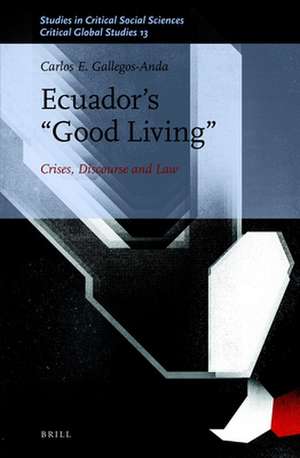Ecuador’s “Good Living”: Crises, Discourse and Law: Studies in Critical Social Sciences / Critical Global Studies, cartea 175/13
Autor Carlos E. Gallegos-Andaen Limba Engleză Hardback – 25 noi 2020
Preț: 936.69 lei
Preț vechi: 1142.32 lei
-18% Nou
Puncte Express: 1405
Preț estimativ în valută:
179.24€ • 187.61$ • 149.18£
179.24€ • 187.61$ • 149.18£
Carte indisponibilă temporar
Doresc să fiu notificat când acest titlu va fi disponibil:
Se trimite...
Preluare comenzi: 021 569.72.76
Specificații
ISBN-13: 9789004439504
ISBN-10: 9004439501
Dimensiuni: 155 x 235 mm
Greutate: 0 kg
Editura: Brill
Colecția Brill
Seria Studies in Critical Social Sciences / Critical Global Studies
ISBN-10: 9004439501
Dimensiuni: 155 x 235 mm
Greutate: 0 kg
Editura: Brill
Colecția Brill
Seria Studies in Critical Social Sciences / Critical Global Studies
Cuprins
List of Figures
Introduction
1 The Context of Good Living
2 Critical Approaches towards Good Living
3 Why Good Living?
4 On Methodology
5 Positioning Critical Good Living: discourse and Rights
6 Book Layout
1 The Context of Good Living: situating Theory and Method
1 Method
2 Politicised Ethnic Cleavage
3 The Retreating State
4 Changing Citizenship Regimes
5 Wider Theoretical Framing
6 Transnational Governmentality
7 Social Protest and Discursive Democracy
8 Conclusion
2 Good Living in the Academic Literature
1 Ecuadorian Discussions on Good Living
2 Indigenist or Pachamama Good Living
3 Developmental or Statist Good Living
4 Ecologist and Post-developmental Good Living
5 Critical Approaches towards Good Living: power Not Ontology
3 The Critical Juncture
1 Theory-guided Process Tracing
2 Development Paradigms in Indigenous Communities
3 Defining the Theory Behind a Theory
4 Lead-up to the Critical Juncture: 1960–1979
4.1 Agrarian Revolts and Reforms
4.2 Oil Induced Military Nationalism
5 Economic, Institutional, and Political Breakdown
5.1 State Retreat
5.2 Regionalist Challenges to State Building
5.3 Economic Turmoil and Reform during the 1980s
5.4 The Financial Meltdown of the 1990s
5.5 Inter-branch Crises and Ghost Coalitions
6 Politicised Ethnic Cleavages: rise and Fall of Indigenous Mobilisation
7 Changing Citizenship Regimes
7.1 The Quest for Civic Virtue
7.2 Constitutional Convergence and Graduated Sovereignty
7.3 Diffusion and the Scripts of Modernity
8 The Inter-American Human Rights System
8.1 Selected Jurisprudence: vida Digna
8.2 The Graduated Sovereignty of the GATT
9 Conclusion
4 The Polymorphism of Good Living
1 The New Governmentality
2 Transnational Governmentality and the Critical Juncture
3 The Theme of Social Capital
4 Social Capital or the Myth of Ethnodevelopment
5 The Sources of Social Capital
6 The Master Framing of Transgressive Politics
7 The Empty Signifier Is Born
8 Yasuní: a Case Study on the Empty Signifier
9 Yasuni and the Discourse of Good Living
5 Beyond Living Well
1 Crafting Good Living: from Speaking to Listening
2 Exhaustion of the Rights Discourse
3 The Importation of Law: local and International Influences
4 From Human Dignity to Vida Digna
5 Graduated Sovereignty and the Role of the IACtHR
6 The Vida Digna Jurisprudence of the Inter-American Court of Human Rights
7 Convergence of Rights: domestic Approaches to Economic, Social and Cultural Rights
8 Back to Basics: recalibrating the “Engine Room of the Constitution”
9 Conclusion
Bibliography
Index
Introduction
1 The Context of Good Living
2 Critical Approaches towards Good Living
3 Why Good Living?
4 On Methodology
5 Positioning Critical Good Living: discourse and Rights
6 Book Layout
1 The Context of Good Living: situating Theory and Method
1 Method
2 Politicised Ethnic Cleavage
3 The Retreating State
4 Changing Citizenship Regimes
5 Wider Theoretical Framing
6 Transnational Governmentality
7 Social Protest and Discursive Democracy
8 Conclusion
2 Good Living in the Academic Literature
1 Ecuadorian Discussions on Good Living
2 Indigenist or Pachamama Good Living
3 Developmental or Statist Good Living
4 Ecologist and Post-developmental Good Living
5 Critical Approaches towards Good Living: power Not Ontology
3 The Critical Juncture
1 Theory-guided Process Tracing
2 Development Paradigms in Indigenous Communities
3 Defining the Theory Behind a Theory
4 Lead-up to the Critical Juncture: 1960–1979
4.1 Agrarian Revolts and Reforms
4.2 Oil Induced Military Nationalism
5 Economic, Institutional, and Political Breakdown
5.1 State Retreat
5.2 Regionalist Challenges to State Building
5.3 Economic Turmoil and Reform during the 1980s
5.4 The Financial Meltdown of the 1990s
5.5 Inter-branch Crises and Ghost Coalitions
6 Politicised Ethnic Cleavages: rise and Fall of Indigenous Mobilisation
7 Changing Citizenship Regimes
7.1 The Quest for Civic Virtue
7.2 Constitutional Convergence and Graduated Sovereignty
7.3 Diffusion and the Scripts of Modernity
8 The Inter-American Human Rights System
8.1 Selected Jurisprudence: vida Digna
8.2 The Graduated Sovereignty of the GATT
9 Conclusion
4 The Polymorphism of Good Living
1 The New Governmentality
2 Transnational Governmentality and the Critical Juncture
3 The Theme of Social Capital
4 Social Capital or the Myth of Ethnodevelopment
5 The Sources of Social Capital
6 The Master Framing of Transgressive Politics
7 The Empty Signifier Is Born
8 Yasuní: a Case Study on the Empty Signifier
9 Yasuni and the Discourse of Good Living
5 Beyond Living Well
1 Crafting Good Living: from Speaking to Listening
2 Exhaustion of the Rights Discourse
3 The Importation of Law: local and International Influences
4 From Human Dignity to Vida Digna
5 Graduated Sovereignty and the Role of the IACtHR
6 The Vida Digna Jurisprudence of the Inter-American Court of Human Rights
7 Convergence of Rights: domestic Approaches to Economic, Social and Cultural Rights
8 Back to Basics: recalibrating the “Engine Room of the Constitution”
9 Conclusion
Bibliography
Index
Notă biografică
Carlos E. Gallegos Anda, Ph.D. (2020) Australian National University. Dr. Gallegos-Anda has served in various positions within the Ecuadorian Government and consulted for a number of international organizations. He has published monographs, translations and edited books regarding environmental law, indigenous rights, Latin-American politics, international public law and socioeconomic rights.












